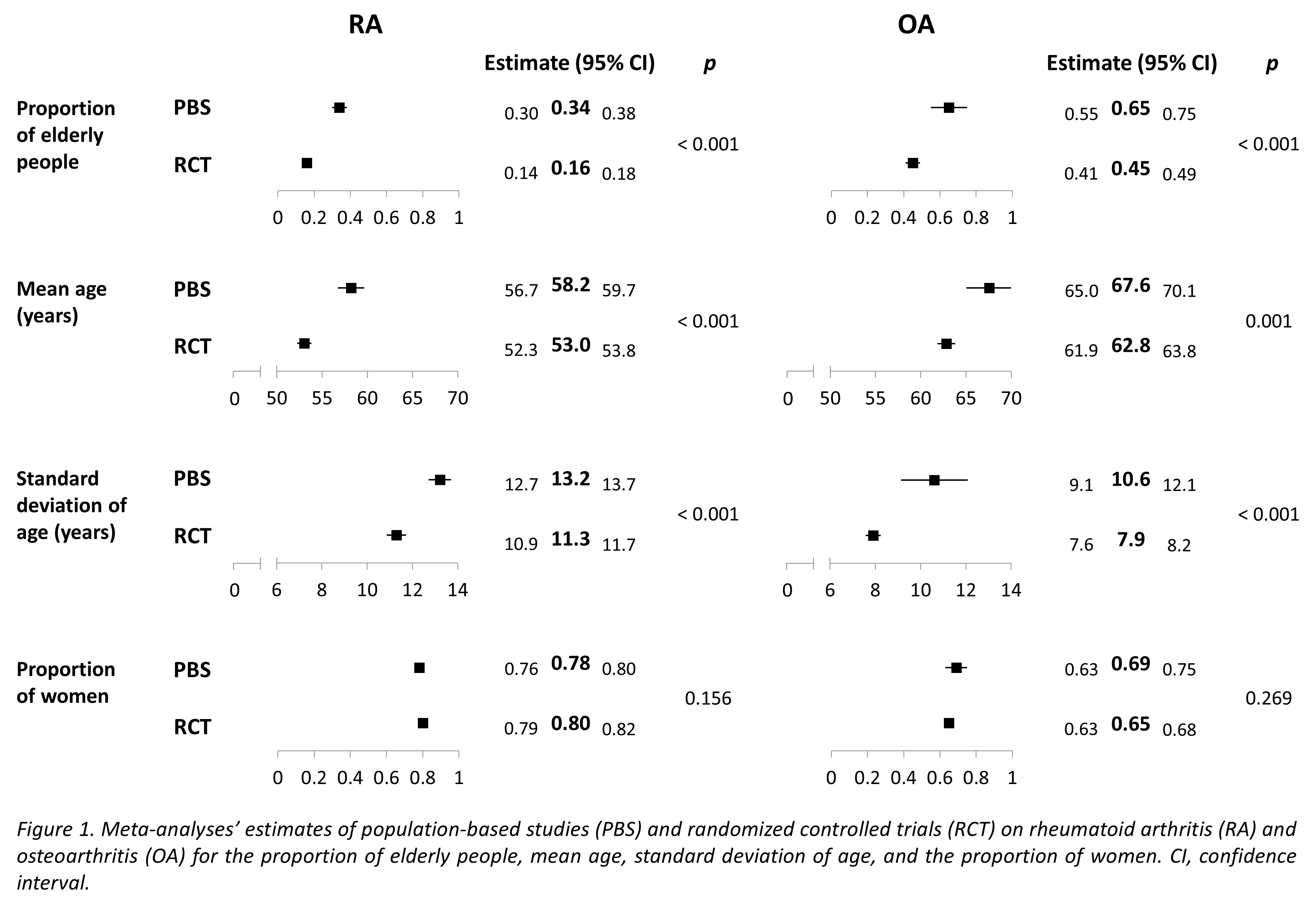Session Information
Session Type: ACR Poster Session A
Session Time: 9:00AM-11:00AM
Background/Purpose: Elderly people (as commonly defined by an age of ≥65 years) and women have been reported to be underrepresented in clinical trials of various medical specialties from past to present. However, it has not yet been quantitatively assessed in rheumatology. Rheumatoid arthritis (RA) and osteoarthritis (OA) are two of the most common chronic rheumatic diseases, major contributors to global disability, and both tend to occur predominantly in the elderly and in women. We assessed whether randomized controlled trials (RCT) in RA and OA include adequate proportions of elderly people and women comparable to data from population-based studies including registries (PBS).
Methods: Our systematic review and meta-analysis was registered with PROSPERO (www.crd.york.ac.uk/prospero/; identifier CRD42018085409). Four systematic searches in MEDLINE (PubMed), extended by a hand search, yielded RCT in RA and OA on any intervention published in 2016 and 2017 and PBS in RA and OA published between 2013 and 2017. Random effects meta-analyses estimated the pooled proportion of elderly people (aged ≥65 years), the mean age and standard deviation (SD), and the proportion of women stratified by disease (RA and OA) and study type (RCT and PBS). The proportion of elderly people was estimated if it could not be abstracted from the original manuscript. Heterogeneity was evaluated with Cochran’s Q and the I2-statistic. Finally, estimates of RCT and PBS were subsequently compared with two-sample Z-Tests.
Results: 265 RCT including over 50,000 participants and 53 PBS including over 520,000 participants were finally deemed eligible, and 260 RCT and 52 PBS were included in quantitative syntheses (i.e., meta-analyses). Heterogeneity was considerable in all meta-analyses with I2 values between 96% and 100%. In both RA and OA, RCT included less elderly people (RA –0.18 [95% confidence interval –0.22 to –0.13] p < 0.001; OA –0.20 [–0.30 to –0.09] p < 0.001) and had lower mean ages (RA –5.2 years [–6.8 to –3.5] p < 0.001; OA –4.7 years [–7.5 to –2.0] p = 0.001) and SD (RA –1.9 years [–2.6 to –1.3] p < 0.001; OA –2.7 years [–4.2 to –1.2] p < 0.001) than did PBS (Figure 1). Five RCT analyzed the influence of age on outcome with conflicting results. Proportions of women were similar in RCT compared to PBS in both RA and OA (RA 0.02 [–0.01 to 0.05] p = 0.156; OA –0.04 [–0.10 to 0.03] p = 0.269).
Conclusion: While women are adequately represented in RA and OA RCT, the elderly are significantly underrepresented. This undermines the applicability of trials’ results to the general population. It is urgent to improve the inclusion of elderly people in clinical trials and study age as a determinant for outcome.
To cite this abstract in AMA style:
Palmowski A, Buttgereit T, Palmowski Y, Nielsen SM, Boers M, Christensen R, Buttgereit F. Representation of Elderly People and Women in Rheumatoid Arthritis and Osteoarthritis Trials: A Systematic Review and Meta-Analysis Comparing Clinical Trials with Population-Based Studies [abstract]. Arthritis Rheumatol. 2018; 70 (suppl 9). https://acrabstracts.org/abstract/representation-of-elderly-people-and-women-in-rheumatoid-arthritis-and-osteoarthritis-trials-a-systematic-review-and-meta-analysis-comparing-clinical-trials-with-population-based-studies/. Accessed .« Back to 2018 ACR/ARHP Annual Meeting
ACR Meeting Abstracts - https://acrabstracts.org/abstract/representation-of-elderly-people-and-women-in-rheumatoid-arthritis-and-osteoarthritis-trials-a-systematic-review-and-meta-analysis-comparing-clinical-trials-with-population-based-studies/

